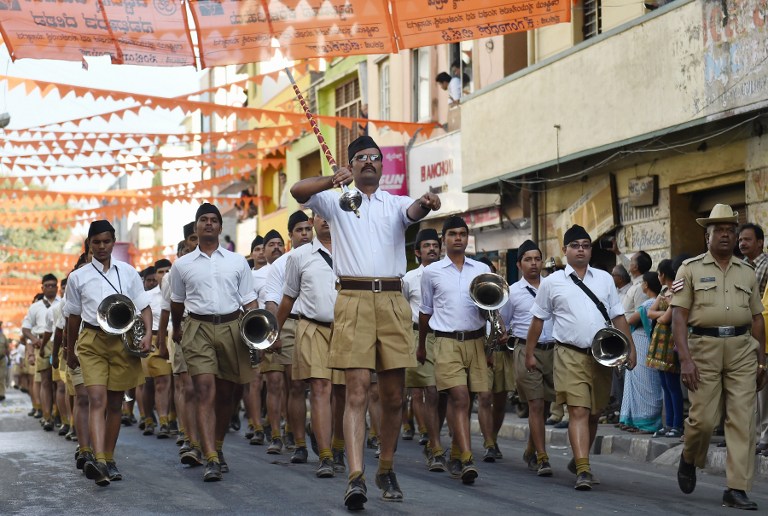 This file photo taken on January 9, 2016, shows the band of India's Rashtriya Swayamsevak Sangh (RSS) as they take part in the 'Shrung Ghosh Path Sanchalan' (Route March by Brass Band) by RSS cadets in Bangalore. – AFP pic, March 13, 2016.A hardline Indian Hindu movement announced today it was abandoning its trademark khaki shorts to try to modernise the dress code, 91 years after adopting the austere military-style uniform.
This file photo taken on January 9, 2016, shows the band of India's Rashtriya Swayamsevak Sangh (RSS) as they take part in the 'Shrung Ghosh Path Sanchalan' (Route March by Brass Band) by RSS cadets in Bangalore. – AFP pic, March 13, 2016.A hardline Indian Hindu movement announced today it was abandoning its trademark khaki shorts to try to modernise the dress code, 91 years after adopting the austere military-style uniform.
Foot soldiers of the Rashtriya Swayamsevak Sangh (RSS) are often seen after dawn across India engaged in physical drills and uttering religious chants – dressed in pleated shorts, white shirts and black hats.
But RSS general secretary Suresh Bhaiyyaji Joshi acknowledged the organisation, the ideological fountainhead of Prime Minister Narendra Modi's ruling party, must keep in step with a modern, changing world.
"We have decided to replace khaki half-pants with brown pants. We are not rigid and take decisions according to the times," Joshi told reporters at a three-day meeting of the group's top decision-making body.
The RSS announced last year it was considering the decision.
The rare sartorial tweak made headline news today in India where the RSS says it has several million members, including at one stage Modi himself.
The RSS styles itself as a cultural organisation devoted to protecting India's Hindu culture. But critics accuse it of being an anti-Muslim pseudo-fascist organisation with a history of fuelling religious tensions.
RSS members carrying bamboo sticks often carry out daily "shakhas" – a combination of physical training, yoga and religious chanting.
The RSS has been banned three times since its inception in 1925, including after a former member assassinated Mahatma Gandhi in 1948.
It was also banned after the 1992 demolition of a mosque in Ayodhya which led to nationwide riots.
Members have spoken out against concessions to religious minorities.
They also oppose homosexuality and the special constitutional status of Muslim-majority Kashmir. – AFP, March 13, 2016.

Comments
Please refrain from nicknames or comments of a racist, sexist, personal, vulgar or derogatory nature, or you may risk being blocked from commenting in our website. We encourage commenters to use their real names as their username. As comments are moderated, they may not appear immediately or even on the same day you posted them. We also reserve the right to delete off-topic comments